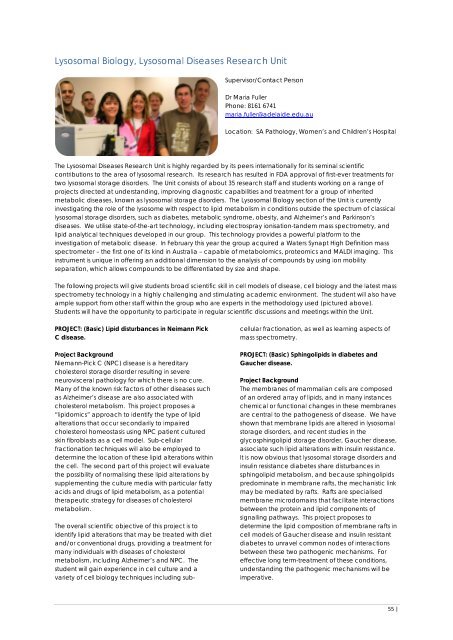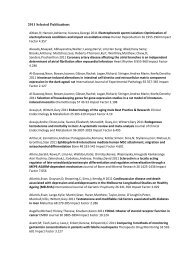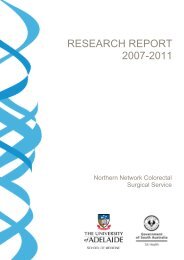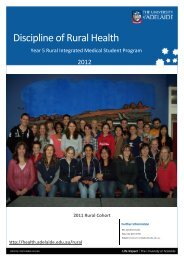Honours Project Book - Faculty of Health Sciences - University of ...
Honours Project Book - Faculty of Health Sciences - University of ...
Honours Project Book - Faculty of Health Sciences - University of ...
Create successful ePaper yourself
Turn your PDF publications into a flip-book with our unique Google optimized e-Paper software.
Lysosomal Biology, Lysosomal Diseases Research Unit<br />
Supervisor/Contact Person<br />
Dr Maria Fuller<br />
Phone: 8161 6741<br />
maria.fuller@adelaide.edu.au<br />
Location: SA Pathology, Women’s and Children’s Hospital<br />
The Lysosomal Diseases Research Unit is highly regarded by its peers internationally for its seminal scientific<br />
contributions to the area <strong>of</strong> lysosomal research. Its research has resulted in FDA approval <strong>of</strong> first-ever treatments for<br />
two lysosomal storage disorders. The Unit consists <strong>of</strong> about 35 research staff and students working on a range <strong>of</strong><br />
projects directed at understanding, improving diagnostic capabilities and treatment for a group <strong>of</strong> inherited<br />
metabolic diseases, known as lysosomal storage disorders. The Lysosomal Biology section <strong>of</strong> the Unit is currently<br />
investigating the role <strong>of</strong> the lysosome with respect to lipid metabolism in conditions outside the spectrum <strong>of</strong> classical<br />
lysosomal storage disorders, such as diabetes, metabolic syndrome, obesity, and Alzheimer’s and Parkinson’s<br />
diseases. We utilise state-<strong>of</strong>-the-art technology, including electrospray ionisation-tandem mass spectrometry, and<br />
lipid analytical techniques developed in our group. This technology provides a powerful platform to the<br />
investigation <strong>of</strong> metabolic disease. In February this year the group acquired a Waters Synapt High Definition mass<br />
spectrometer – the first one <strong>of</strong> its kind in Australia – capable <strong>of</strong> metabolomics, proteomics and MALDI imaging. This<br />
instrument is unique in <strong>of</strong>fering an additional dimension to the analysis <strong>of</strong> compounds by using ion mobility<br />
separation, which allows compounds to be differentiated by size and shape.<br />
The following projects will give students broad scientific skill in cell models <strong>of</strong> disease, cell biology and the latest mass<br />
spectrometry technology in a highly challenging and stimulating academic environment. The student will also have<br />
ample support from other staff within the group who are experts in the methodology used (pictured above).<br />
Students will have the opportunity to participate in regular scientific discussions and meetings within the Unit.<br />
PROJECT: (Basic) Lipid disturbances in Neimann Pick<br />
C disease.<br />
<strong>Project</strong> Background<br />
Niemann-Pick C (NPC) disease is a hereditary<br />
cholesterol storage disorder resulting in severe<br />
neurovisceral pathology for which there is no cure.<br />
Many <strong>of</strong> the known risk factors <strong>of</strong> other diseases such<br />
as Alzheimer’s disease are also associated with<br />
cholesterol metabolism. This project proposes a<br />
“lipidomics” approach to identify the type <strong>of</strong> lipid<br />
alterations that occur secondarily to impaired<br />
cholesterol homeostasis using NPC patient cultured<br />
skin fibroblasts as a cell model. Sub-cellular<br />
fractionation techniques will also be employed to<br />
determine the location <strong>of</strong> these lipid alterations within<br />
the cell. The second part <strong>of</strong> this project will evaluate<br />
the possibility <strong>of</strong> normalising these lipid alterations by<br />
supplementing the culture media with particular fatty<br />
acids and drugs <strong>of</strong> lipid metabolism, as a potential<br />
therapeutic strategy for diseases <strong>of</strong> cholesterol<br />
metabolism.<br />
The overall scientific objective <strong>of</strong> this project is to<br />
identify lipid alterations that may be treated with diet<br />
and/or conventional drugs, providing a treatment for<br />
many individuals with diseases <strong>of</strong> cholesterol<br />
metabolism, including Alzheimer’s and NPC. The<br />
student will gain experience in cell culture and a<br />
variety <strong>of</strong> cell biology techniques including sub-<br />
cellular fractionation, as well as learning aspects <strong>of</strong><br />
mass spectrometry.<br />
PROJECT: (Basic) Sphingolipids in diabetes and<br />
Gaucher disease.<br />
<strong>Project</strong> Background<br />
The membranes <strong>of</strong> mammalian cells are composed<br />
<strong>of</strong> an ordered array <strong>of</strong> lipids, and in many instances<br />
chemical or functional changes in these membranes<br />
are central to the pathogenesis <strong>of</strong> disease. We have<br />
shown that membrane lipids are altered in lysosomal<br />
storage disorders, and recent studies in the<br />
glycosphingolipid storage disorder, Gaucher disease,<br />
associate such lipid alterations with insulin resistance.<br />
It is now obvious that lysosomal storage disorders and<br />
insulin resistance diabetes share disturbances in<br />
sphingolipid metabolism, and because sphingolipids<br />
predominate in membrane rafts, the mechanistic link<br />
may be mediated by rafts. Rafts are specialised<br />
membrane microdomains that facilitate interactions<br />
between the protein and lipid components <strong>of</strong><br />
signalling pathways. This project proposes to<br />
determine the lipid composition <strong>of</strong> membrane rafts in<br />
cell models <strong>of</strong> Gaucher disease and insulin resistant<br />
diabetes to unravel common nodes <strong>of</strong> interactions<br />
between these two pathogenic mechanisms. For<br />
effective long term-treatment <strong>of</strong> these conditions,<br />
understanding the pathogenic mechanisms will be<br />
imperative.<br />
55 |





